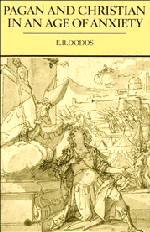 Pagan and Christian in an Age of Anxiety
Pagan and Christian in an Age of Anxiety I - MAN AND THE MATERIAL WORLD
Published online by Cambridge University Press: 01 June 2011
Summary
The meaningless absurdity of life is the only incontestable knowledge accessible to man.
TOLSTOIThe Wiles Trust, to which this book owes its origin, was established ‘to promote the study of the history of civilisation and to encourage the extension of historical thinking into the realm of general ideas’. In what way the present volume of lectures can hope to serve that aim I can perhaps best indicate by quoting two remarks made by eminent ancient historians. In the last chapter of his Social and Economic History of the Roman Empire, after examining and criticising the numerous theories, political, economic and biological, by which men have sought to explain the decline of the Empire, Rostovtzeff finally turned to psychological explanation. He expressed the view that a change in people's outlook on the world ‘was one of the most potent factors’; and he added that further investigation of this change is ‘one of the most urgent tasks in the field of ancient history’. My second quotation is from the closing chapter of Professor Nilsson's Geschichte der griechischen Religion. He writes: ‘The study of the syncretism of late antiquity which has been actively pursued in recent decades has concerned itself mainly with beliefs and doctrines, while the spiritual soil from which these growths arose and drew their nourishment has been touched on only in passing and in general terms; yet that is the heart of the matter, its weightiest element.’
- Type
- Chapter
- Information
- Pagan and Christian in an Age of AnxietySome Aspects of Religious Experience from Marcus Aurelius to Constantine, pp. 1 - 36Publisher: Cambridge University PressPrint publication year: 1965
